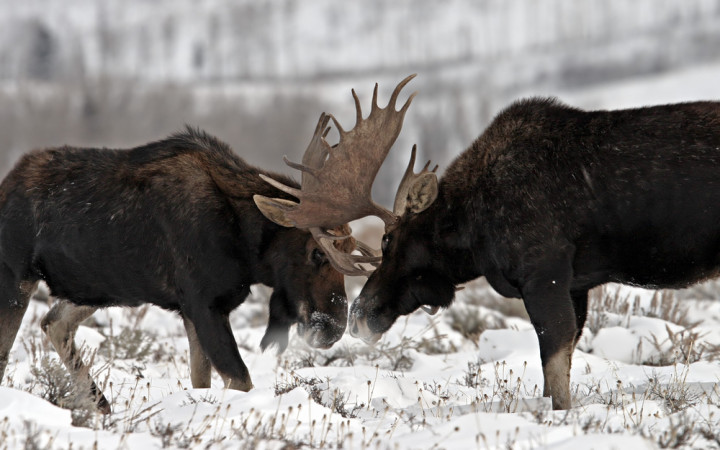Today’s Wonder of the Day was inspired by Maggie. Maggie Wonders, “What is the plural of moose?” Thanks for WONDERing with us, Maggie!
As our many Wonder Friends may or may not know, Wonderopolis is filled with all sorts of interesting animals. From manatees and electric eels to angry birds and chinchillas, Wonderopolis is teeming with WONDERful wildlife.
Occasionally, though, things can get a little confusing. Perhaps a simple example will help you understand what we mean.
The other day, we were taking the shortcut through the forest when we came to a clearing. We were surprised to find a fox and an ox having a picnic.
Of course, we were curious and asked if we could join them. They didn't mind and even shared their peanut butter and cotton candy sandwiches with us.
While we were chewing, they had the following conversation:
Ox: I love these sandwiches, but the other oxen prefer hamburgers.
Fox: You mean the other oxes?
Ox: Oxes? No, I mean oxen. What about the other foxen? Do they like hamburgers?
Fox: Foxen? What are you talking about? You mean the other foxes?
Ox: Huh?
Fox: What?
There's no need to tell the rest of the story. Let's just say an argument of grammatical proportions soon broke out.
Of course, it's easy to understand their confusion. When talking about nouns (persons, places, or things), going from one thing (singular) to more than one thing (plural) can be tricky at times.
Usually, you can make a noun plural just by adding an “s" to the end of it.
For example, if you go to the Wonder of the Day storeroom in Wonderopolis, you'll see that today's Wonder of the Day (singular) is sitting out in the open, waiting to be filed. All the previous Wonders of the Day (plural) are on the shelves along the wall.
There are some special rules for certain types of words, though. Here are a few of those special rules:
- For nouns that end with -ch, -sh, -s, -x, or -z, you have to add “es" to the end to make them plural. For example, you can make one peanut butter and cotton candy sandwich (singular), or you can make several such sandwiches (plural) for all your friends.
- For nouns that end in -f or -fe, you have to drop the -f or -fe and add “ves" to make them plural. For example, one knife (singular) will cut one sandwich easily, but you may need many knives (plural) if you make hundreds of sandwiches.
- For nouns that end in -o, you need to add “es" to make them plural. For example, you can be a hero (singular) by yourself, or you and your friends can all be heroes (plural).
- For nouns that end in a consonant (all the letters except the vowels a, e, i, o, u, and sometimes y!) and -y, you need to drop the -y and add “ies" to make them plural. For example, one butterfly (singular) may be beautiful, but several butterflies (plural) can be breathtaking.
Unfortunately, there are also exceptions to all of these rules. It takes time to learn them all. Reading a lot and paying close attention in your language arts classes can help you get familiar with the many different nouns and their plural forms.
One such exception is the group of words that stay the same whether singular or plural. For example, deer and sheep are two such words. It's perfectly OK to say you saw one deer yesterday and three deer today. Or maybe you sheared one sheep on Tuesday and seven sheep on Thursday.
Other nouns just don't follow any rules. These rebels are called “irregular," and they can get a little crazy.
For example, when we finished our picnic with the fox and the ox, we went to sit by the lake, where we saw a goose (singular). We fell asleep and woke up to find that goose talking to another goose. One said to the other, “We're geese" (plural). This, of course, confused the moose that was standing nearby.
The moose (singular) tends to be a solitary animal, but occasionally he gets together with his friends. Together, what are they called? Meese? Mooses? Moosen? Nope! Moose (plural) — it's another one of those words that's the same whether it's singular or plural!
As for the fox and the ox, it's easy to see why they got confused. Fox follows the special rule of adding “es" to make it plural (foxes). Ox, on the other hand, is one of those “irregular" words. Instead of “oxes," the plural of ox is oxen.




